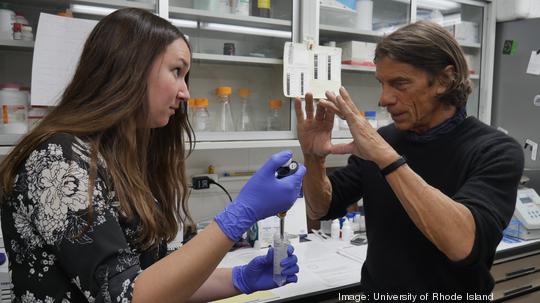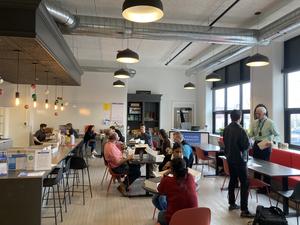
Discovered thousands of years ago and cultivated by Ben Franklin in America, super-crop sorghum can be used from everything to grain to forage, but one Rhode Island scientist is working on powering it up even further, in hopes of boosting its viability as a biofuel.
Professor Albert Kausch, the Director of the University of Rhode Island’s Plant Biotechnology Laboratory is leading a workshop, sponsored by the Dept. of Energy and the National Science Foundation, with the goal of further developing sorghum as a bioenergy crop, using it as an alternative to corn.
The Cereal Crop Plant Transformation and Genome Editing Training workshop runs through April 20 at Kausch’s lab in the West Kingston Research Facility and includes 11 scientists from across America and Argentina.
Sorghum is drought tolerant and grows on marginal land, meaning it can be grown where other crops can’t grow. While it’s currently mainly used for livestock feed and ethanol production, it’s growing in popularity as an ingredient in consumer foods. The crop is also full of protein, iron, vitamin B6, niacin, magnesium and phosphorus and is also high-energy, providing 10 percent protein and nearly 75% complex carbohydrates recommended. The United States is the world’s largest producer of grain sorghum, having produced 373 million bushels in 2020.
Kausch’s lab received an initial DOE award of $6 million about 15 years ago to fund research on bioenergy crops using advanced plant breeding and molecular biology approaches. He is currently funded as a co-principal investigator of a large DOE project on a $16 million award and as the primary investigator of a $2.1 million NSF award. The Cereal Crop workshop is the last using that NSF funding, Kausch said, and was delayed by COVID.
While other teams and companies are working to maximize the transformation of plants into fuel, Kausch’s work mostly focuses on how best to optimize plants along their journey towards becoming fuel.
“We’re using sophisticialted biological approaches to modify the genes of the plants in a couple of ways,” Kausch said. “Corn uses starch to make ethanol, but we’re looking at the energy locked into ligman and cellulose to can be turned into ethanol or petroleum. So, we’re optimizing those plants for yield in cellulose. At the same time, we’re doing the same for photosynthesis and carbon capture, which can make the whole thing carbon neutral or carbon negative.”
The technology to turn sorghum into fuel currently allows for the creation of gasoline, bunker oil (a term used for ship oil), and jet fuel.
Since 2000, Kausch said he’s seen interest in the biofuel market and the technology to make it grow but there’s a real need to train and educate a new generation of scientists in the field. As such, the workshop will include several lectures and training on the genetics of sorghum.
“There is a large and growing need for trained individuals in this and related areas in agricultural biotechnology and bioenergy. There are many new careers and jobs, which didn’t exist five years ago, with very few people trained in this area,” he said.
Kausch is increasingly concerned that as his generation tries to pass the torch, there's no one to take it, so he’s been working to encourage, motivate, and teach younger scientists.
“We have reached that crossover tipping point where the technologies have improved, and the result can be competitive in the market,” Kausch said.
While study into its use as a biofuel is central, Kausch said part of the mission and this biology is to understand and improve the cereal crops as a food source.








